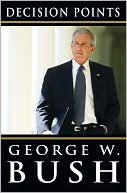| TRANSFORMING LEADERSHIP | |
| BY DEVELOPING GREAT LEADERS |

|
|
|
| THE PLAN - LEAD - EXCEL LETTER |
| Newsletter Home | Bob's Thoughts | Guest Column | Review | Newsletter Archives | Plan-Lead-Excel Home |
|
|
 |
THE REVIEW |
Decision Points by George W. Bush | |
|
Acquiring all the books written by U.S. presidents would result in a surprisingly small collection. Though there are some anthologies of presidential papers and speeches from the 19th century, true autobiographies are rare, the most notable being that of Ulysses S. Grant. That's all changed beginning with Harry S. Truman. In fact, since Truman, every president with the obvious exception of John F. Kennedy, has written some sort of post-presidential memoir. Their writings provide an interesting look behind the fence of the White House and into the rarified atmosphere that is the U.S. presidency. Of course, past presidents seem quite interested in their legacy and might be accused of writing memoirs to burnish their image as they fade into history. As an amateur student of history, I enjoy reading these books; but, to me their real value is the portrayal of what is certainly one of the most difficult and unique leadership challenges any person can shoulder. The reader of an autobiography must always keep in mind that the work is written by the subject, and therefore must be more critically analyzed. Presidential autobiographies have an additional problem in that the author knows details about the events they relate that must be forever withheld from the general public. With these cautions in mind, I read Decision Points by George W. Bush. President Bush took office under a cloud. The election of 2000 was a trying experience for the candidates in particular and the country as a whole. Though this cloud would stay with his presidency for the entire eight years, to his credit Bush did not let it sway his agenda. The keystone of that agenda was a push for education reform - until September 11, 2001. As Bush details the events that followed that historic day the heavy weight of leadership clearly emerges. He explains his thoughts immediately following the attack and why he took the actions he did. He demonstrated that a leader is most effective when able to remain outwardly calm and remember that people are relying on him or her for thoughtful leadership. Many other events happened during the Bush years and he is refreshingly honest about what he feels he didn't do well. In discussing Hurricane Katrina and the devastation the Gulf Coast, he clearly lays out the mistakes that were made, including his decision to fly over New Orleans, instead of landing. Again, his explanation provides a good lesson for leaders. Knowing that any presidential visit is very disruptive, and stopping at that time would pull people away from the important task of trying to save lives, it seemed like a good decision. However, leaders must always remember that the perception of their action may have more impact than the action itself. Bush's decision was based on his desire to not exacerbate the situation. His action was seen as the exact opposite; as lack of concern for suffering people. In the 222 years since George Washington was inaugurated as the first President in 1789 there have been only 44 presidents making that office one of the world's most exclusive leadership clubs. The U.S. president accepts a leadership role more difficult, more wide ranging, and more publicly scrutinized than any other. How he performed in that role provides a treasure trove from which the rest of us can glean lessons to become better leaders. For those who were paying attention during the Bush presidency, Decision Points provides no real historical revelations, though Bush does discuss some very effective policy to help African nations fight AIDs which didn't get a lot of notice in the American press. There does seem to be a "set the record straight" agenda and maybe even a little legacy management, but I would expect that and it certainly doesn't take away from the value of the book. Whether you thought George W. Bush was a great president, a terrible president, or somewhere in-between, if you have leadership responsibilities, you need to read this book. Its significance is the view of rare leadership challenges. |
Follow Me! | |
| RLM PLANNING AND
LEADERSHIP PO Box 50984 Albuquerque, NM 87181-0984 866-243-1682 www.planleadexcel.com email rlm@planleadexcel.com PLAN - LEAD - EXCEL | |